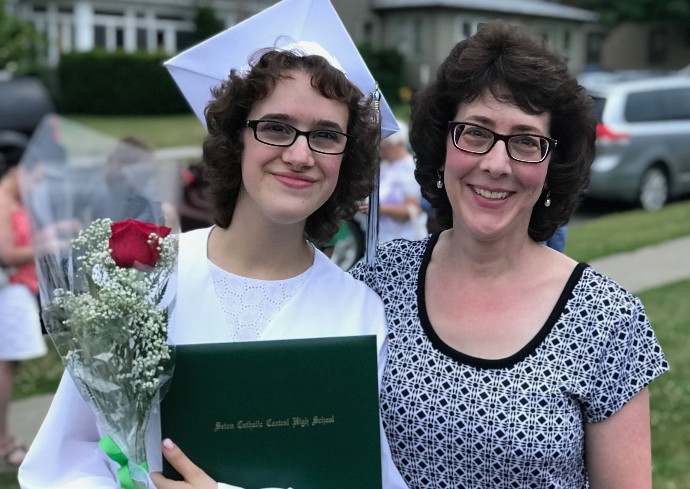Funded by a contribution from Karen Colapietro Seybold G’92, a pilot project in the Center on Disability and Inclusion will create research opportunities and direct support for matriculated autistic students at Syracuse University.

Karen Colapietro Seybold G’92 with daughter Lauren at her high school graduation in June 2018.
Seybold graduated from the School of Education in 1992 with a master’s degree in counselor education. She received financial assistance as a part-time graduate student through the Burton Blatt Scholarship, and after two years in the program she earned a position in Career Services where she worked full-time while completing her degree part-time. Seybold also holds a bachelor’s degree from Cornell University.
Seybold is a loyal donor to the School of Education. Fueled by a desire to make a significant difference in an area she is passionate about, and inspired by her daughter, Lauren, who has autism, she decided to fund this new program aimed to provide essential academic and social support services for autistic college students.
Through her own experience as an advocate for Lauren, Seybold knows this is a real need in higher education institutions worldwide and looks forward to seeing the impact of the program here at Syracuse. Her frustration began with finding an accurate diagnosis and evolved into seeking the appropriate services and supports. She has progressively realized that there aren’t enough options in the area.
Overall, Seybold hopes students will determine the specific gaps the funding will fill.
“I want students like my daughter Lauren to have access to essential services that support their college goals,” Seybold says.
Specific plans include addressing students’ general academic and social needs through a College Skills Workshop Series and inclusive social and team-building events. Part of the program will involve educating other students and staff on how autistic students communicate and approach daily life.
School of Education doctoral student Nate Hughes, who is autistic, argues that the philosophies universities use to support autistic students, specifically those pursuing degrees, are flawed. Hughes said degree-seeking autistic students are sometimes ignored.
“I feel that sometimes students with autism might not get the support they need when it comes to social interaction in a college setting and some of the academic expectations in high school,” Hughes says. “Students are expected to advocate for themselves at the university level, and this can be tough due to social anxiety, isolation and other areas of need.”
He hopes to see Syracuse further its mission of inclusion by becoming an inclusive environment for all learners and promoting autism acceptance on a larger scale. Historically, college campuses have not been inclusive of autistic students, but Hughes said he’s encouraged by the efforts to improve disability services, which begins with helping students create a schedule with more structure.
The Center on Disability and Inclusion (CDI) in the School of Education is a disability-related research center that works to develop and implement initiatives promoting the inclusion of people with disabilities in all aspects of school and society—both locally and globally.
CDI Assistant Director Beth Myers says that the support from Seybold will further disability inclusion on campus and beyond. “Karen has found a groundbreaking way to better meet the needs of students at Syracuse, and we are so grateful for her collaboration on this pilot program.”
She adds that assisting students with creating structured schedules will go a long way in furthering disability inclusion. “Some students who have come to us have specifically mentioned that they want to feel more included with their peers,” Myers says. “We hope that some inclusive team-building events, like lunches, the ropes course or a trivia night, would help students connect to others who might also want to meet new people.”
Listening to students with autism will be key in determining what areas to direct the funding to, and in conversations with students, Myers has learned that part of the college experience for autistic students is often a feeling of disconnect. She says some students have come forward and requested more support with things like communicating with professors, managing assignments and time, and problem-solving on campus.
“We’re hoping to find better ways to support autistic students as they work toward a degree,” Hughes says. “This is something that is very important to us due to autistics being less likely to finish college and/or obtain meaningful employment than their non-autistic peers. Through this, we’re really looking to help all students be as successful as possible as they make the transition into adulthood.”
Story by Joey Pagano, graduate student in the School of Education.
"degree" - Google News
August 21, 2021 at 05:47AM
https://ift.tt/3k9t0og
Center on Disability and Inclusion Launches Program to Support Degree-Seeking Autistic Students - Syracuse University News
"degree" - Google News
https://ift.tt/2zPqEHn
https://ift.tt/2WkjZfX
Bagikan Berita Ini















0 Response to "Center on Disability and Inclusion Launches Program to Support Degree-Seeking Autistic Students - Syracuse University News"
Post a Comment